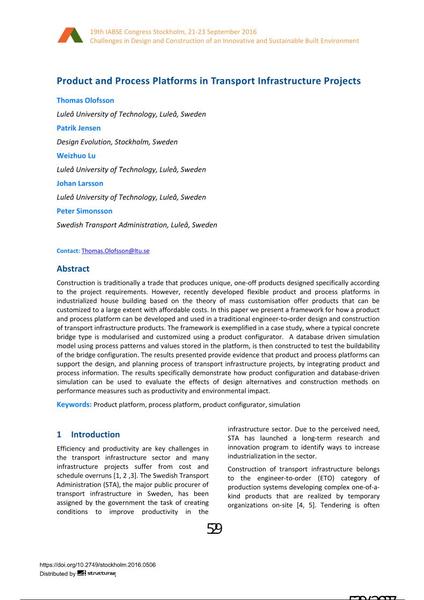Product and Process Platforms in Transport Infrastructure Projects

|
|
|||||||||||
Bibliografische Angaben
| Autor(en): |
Thomas Olofsson
(Luleå University of Technology, Luleå, Sweden)
Patrik Jensen (Design Evolution, Stockholm, Sweden) Weizhuo Lu (Luleå University of Technology, Luleå, Sweden) Johan Larsson (Luleå University of Technology, Luleå, Sweden) Peter Simonsson (Swedish Transport Administration, Luleå, Sweden) |
||||
|---|---|---|---|---|---|
| Medium: | Tagungsbeitrag | ||||
| Sprache(n): | Englisch | ||||
| Tagung: | IABSE Congress: Challenges in Design and Construction of an Innovative and Sustainable Built Environment, Stockholm, Sweden, 21-23 September 2016 | ||||
| Veröffentlicht in: | IABSE Congress Stockholm, 2016 | ||||
|
|||||
| Seite(n): | 529-536 | ||||
| Anzahl der Seiten (im PDF): | 8 | ||||
| Jahr: | 2016 | ||||
| DOI: | 10.2749/stockholm.2016.0506 | ||||
| Abstrakt: |
Construction is traditionally a trade that produces unique, one-off products designed specifically according to the project requirements. However, recently developed flexible product and process platforms in industrialized house building based on the theory of mass customisation offer products that can be customized to a large extent with affordable costs. In this paper we present a framework for how a product and process platform can be developed and used in a traditional engineer-to-order design and construction of transport infrastructure products. The framework is exemplified in a case study, where a typical concrete bridge type is modularised and customized using a product configurator. A database driven simulation model using process patterns and values stored in the platform, is then constructed to test the buildability of the bridge configuration. The results presented provide evidence that product and process platforms can support the design, and planning process of transport infrastructure projects, by integrating product and process information. The results specifically demonstrate how product configuration and database-driven simulation can be used to evaluate the effects of design alternatives and construction methods on performance measures such as productivity and environmental impact. |
||||
